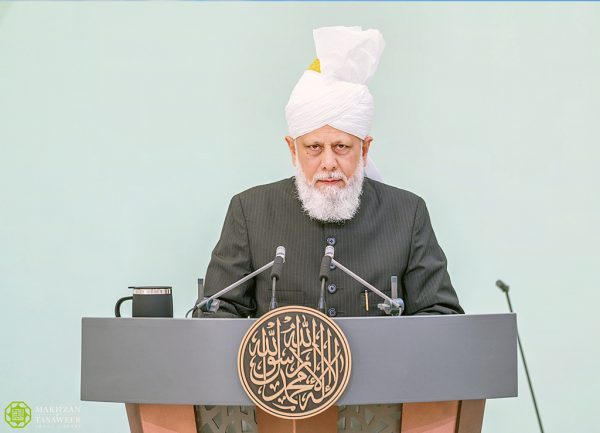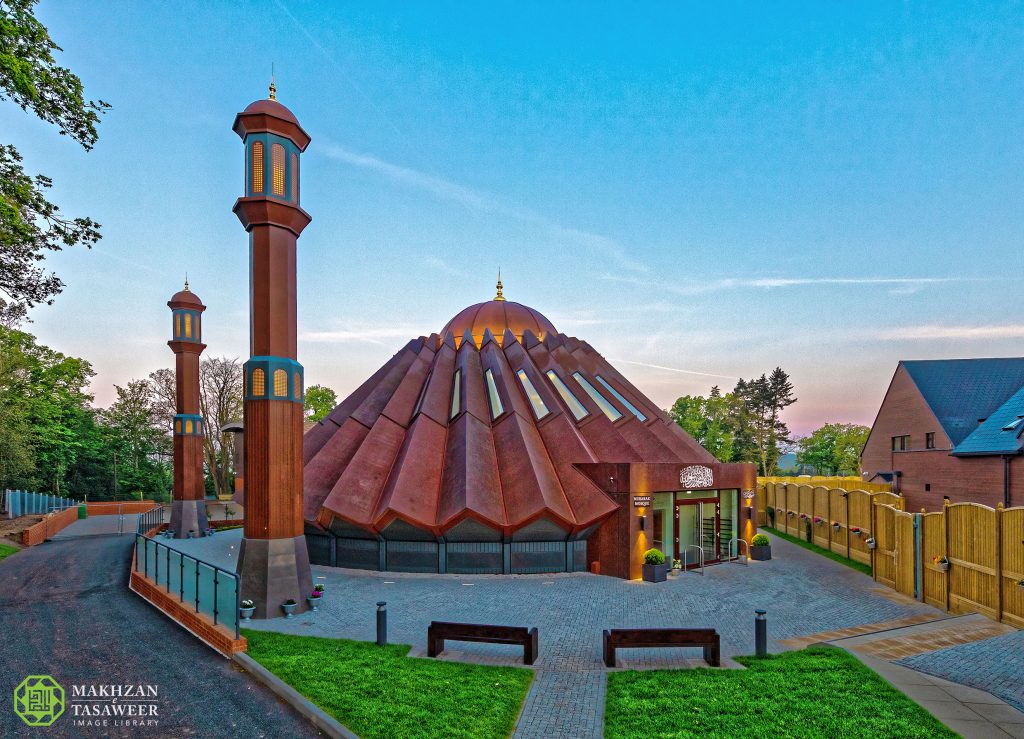After reciting Tashahhud, Ta‘awwuz and Surah al-Fatihah, His Holiness, Hazrat Mirza Masroor Ahmad (aba) said that in the previous sermon, he mentioned how the Holy Prophet (sa) reached near Makkah with his army and set up camp undetected.

Obedience of the Believers & How it Affected Abu Sufyan
His Holiness (aba) said that the Holy Prophet (sa) instructed for 10,000 fires to be lit. When Abu Sufyan and his comrades saw this, they grew worried. Upon the insistence of Hazrat Abbas (ra), Abu Sufyan agreed to go with him to meet the Holy Prophet (sa). Abu Sufyan was worried that Hazrat Umar (ra) might kill him upon seeing him; however, the Holy Prophet (sa) had already instructed his Companions not to kill Abu Sufyan. Seeing the numbers accompanying the Holy Prophet (sa) had a profound impact of Abu Sufyan, who just a few years prior had seen the Muslims with hardly any numbers. When the Holy Prophet (sa) saw Abu Sufyan, he said that he should spend the night and he would meet with him in the morning.
His Holiness (aba) said that the next morning, when Abu Sufyan saw the Muslims preparing for the morning prayer offered right before dawn, he grew worried that perhaps they were preparing some new form of punishment for him, as he’d never seen this sight before. However, he was reassured that they were only preparing for the prayer. Then, Abu Sufyan saw the thousands of Muslims offering prayer, following the Holy Prophet’s (sa) every action. When he asked Hazrat Abbas (ra) about this, he was told that even if the Holy Prophet (sa) were to tell the Muslims to stop eating, they would immediately follow him. Abu Sufyan said that he had visited some of the greatest rulers in the land; however, he had never seen followers as loyal and prepared to follow their leader.
His Holiness (aba) said that then Abu Sufyan was taken to the Holy Prophet (sa), who asked if he had not by now realised that there is none worthy of worship except Allah. Abu Sufyan replied that he realised if there had been another god, he would have helped him and the Makkans by now. The Holy Prophet (sa) then asked if Abu Sufyan had not realised that Muhammad (sa) was the Messenger of Allah. To this, he said that he still had some doubts about that. Nonetheless, Abu Sufyan went on to pledge allegiance to the Holy Prophet (sa). It was then, after the Conquest of Makkah, that Abu Sufyan’s (ra) heart was completely opened for Islam.
Protection Granted to the Makkans & Peaceful Entrance of the Muslims
His Holiness (aba) said that the Holy Prophet (sa) was then asked by Hakim bin Hizam (ra) whether he had brought this large army to destroy the Makkans. The Holy Prophet (sa) said that he trusted that the conquest and victory at Makkah, and the downfall of the Hawazin would all be tended to by God through the Holy Prophet (sa). Then, Abu Sufyan (ra) asked if the Makkans would be safe if they were not to raise their swords. The Holy Prophet (sa) said yes, and that anyone who remained in their homes would remain safe. The Holy Prophet (sa) went on to say that anyone who was in Abu Sufyan’s (ra) home and anyone who went inside the Ka’bah would be protected. Similarly, those who laid down their arms, those who closed the doors to their homes, and those who were inside the home of Hakim bin Hizam would all be safe and protected.
His Holiness (aba) said that when Abu Sufyan (ra) and Hakim bin Hizam (ra) were returning to Makkah, Hazrat Abbas (ra) expressed his doubt about Abu Sufyan’s acceptance of Islam. The Holy Prophet (sa) said that he should be brought back so that he may properly learn about Islam and so that he may see the complete breadth of the Muslim army. When all the contingents of the Muslim army, divided according to tribe, set out, and Abu Sufyan (ra) saw them, Abu Sufyan (ra) asked about each of them. When the final contingent passed by, which also included the Holy Prophet (sa), Abu Sufyan (ra) asked if he had commanded his army to fight. The Holy Prophet (sa) replied, saying that this was a day of mercy, on which God would grant honour to the Ka’bah and true respect to the Quraish.
His Holiness (aba) said that Hazrat Abbas (ra) sought permission from the Holy Prophet (sa) to go ahead and invite the Makkans to Islam. The Holy Prophet (sa) granted permission, and so Hazrat Abbas (ra) went ahead and invited the Makkans to accept Islam, and told them about the large army that accompanied the Holy Prophet (sa). When Abu Sufyan’s (ra) wife Hind saw Abu Sufyan (ra) accompanying the Muslims, she stepped forward, held him by the beard and called for the Makkans to kill him. Abu Sufyan (ra) said that now was not the time for such things, and told her that she should go to her home so that she may remain protected, as he had come with an army so powerful, the likes of which had never been seen in Arabia.
His Holiness (aba) said that the Holy Prophet (sa) appointed various contingents to enter Madinah from various points and to raise their flag there. The Holy Prophet (sa) instructed all the commanders to ensure that they did not engage in battle, and to only fight if someone approached and attacked them.
His Holiness (aba) said that one Makkan started putting on his armour. When his wife asked what he was doing, he said he was preparing to fight the Muslims. His wife wisely advised him that this army was not to be fought with and that he should stand down. The man told his wife that he would certainly capture one of the Muslims as a slave and bring him to her. She again pleaded with him not to fight against the Holy Prophet (sa) and his companions, but he stubbornly insisted. When Hazrat Khalid bin Walid (ra) entered from his appointed point along with the contingents he was leading, a contingent of the Makkan army stood before them to stop their way and started launching arrows at them. The contingents of the Muslim army defended themselves, ultimately leading to a swift defeat of the disbelievers. That same man who had promised his wife to bring her a Muslim slave fled back to his home and told his wife to close the door. She asked him what happened to all of his tall claims, to which he remorsefully responded, saying she had not seen the great Muslim army.
Beautiful Retribution of Hazrat Bilal (ra)
His Holiness (aba) said that the Holy Prophet (sa) had someone announce the ways in which the Makkans could seek protection; by laying down their arms, by going into their homes and closing their doors, by entering the homes of Abu Sufyan (ra) and Hakim bin Hizam (ra) and by entering the Ka’bah. As the Holy Prophet (sa) saw the Makkans entering into protection in these ways, he certainly would have recalled the cruelties that had taken place in those very streets just a few years prior. The same Bilal (ra) who was dragged through the streets a few years prior had now returned to those very streets as a member of this great Muslim army. And so, the Holy Prophet (sa) would certainly have to take revenge, but he did so in a most beautiful manner. The Holy Prophet (sa) granted a flag to Abu Ruwaihah (ra) and instructed Hazrat Bilal (ra) to announce that anyone who stood under the flag of Abu Ruwaihah (ra) would also be protected. How wise and beautiful this was. These streets had not been a place of protection for Bilal (ra), who would have a rope tied to his ankle and be dragged through the streets. The Holy Prophet (sa) knew that Hazrat Bilal (ra) must have had thoughts of revenge going through his mind, and he had to remain mindful of his loyal companion. At the same time, this revenge had to be according to the honour of Islam. Hence, the Holy Prophet’s (sa) revenge for Bilal (ra) was not through the sword, but it was by handing the flag to Bilal’s (ra) brother, and then appointing Bilal (ra) to announce that anyone who stood under his brother’s flag would be protected. How beautiful a revenge this was.
His Holiness (aba) said that the Holy Prophet (sa) entered Makkah from the mountainous path of Azakhir. When he saw the glistening of swords, he reminded the Muslims that he had instructed that there should be no battle. He was informed that Khalid bin Walid’s (ra) contingents had been attacked first by the Makkans, and they had to defend themselves. To this, the Holy Prophet (sa) replied that Allah’s decision is best. In other words, God wished to show the Makkans that they would not be able to use force to stop the Muslims from entering Makkah.
His Holiness (aba) stated that he would continue to mention these details in the future.

Funeral Prayer
His Holiness (aba) said that he would lead the funeral prayer of the following deceased member:
Aminah Shanas
Aminah Shanas, wife of Inamullah Sahib from Lahore. She is survived by her husband, son and four daughters. Her son is serving as a missionary in Senegal and, due to being in the field of service, was unable to attend his mother’s funeral. He says that his mother was very virtuous, given to prayer and fasting, regularly recited the Holy Qur’an, and had profound love for Khilafat. She enjoined her children to write letters to the Caliph. She was very hospitable and took better care of them, even if it was beyond her means to do so. She was also very loving towards her non-Ahmadi neighbours, even if they showed opposition to Ahmadiyyat. She was very supportive of her husband in his services to the Community. She was regular in offering financial contributions, even on behalf of deceased family members. One of her non-Ahmadi neighbours said that she treated her like a sister, and her children considered her to be their aunt. She served in her locality as the Finance Secretary and rendered great services. His Holiness (aba) prayed that may Allah grant her forgiveness and mercy. May Allah grant her son, who couldn’t attend her funeral, patience and forbearance. May Allah make all her children the recipients of her prayers.
Summary prepared by The Review of Religions




Add Comment